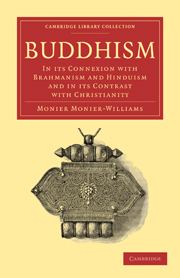Book contents
- Frontmatter
- Preface
- Postscript on the common error in regard to the comparative prevalence of Buddhism in the world
- Contents
- List of Illustrations
- Rules for Pronunciation
- Pronunciation of Buddha, etc. Addenda and Corrigenda
- LECTURE I INTRODUCTORY OBSERVATIONS
- LECTURE II THE BUDDHA AS A PERSONAL TEACHER
- LECTURE III THE DHARMA OR LAW AND SCRIPTURES OF BUDDHISM
- LECTURE IV THE SAṄGHA OR BUDDHIST ORDER OF MONKS
- LECTURE V THE PHILOSOPHICAL DOCTRINES OF BUDDHISM
- LECTURE VI THE MORALITY OF BUDDHISM AND ITS CHIEF AIM—ARHATSHIP OR NIRVĀṆA
- LECTURE VII CHANGES IN BUDDHISM AND ITS DISAPPEARANCE FROM INDIA
- LECTURE VIII RISE OF THEISTIC AND POLYTHEISTIC BUDDHISM
- LECTURE IX THEISTIC AND POLYTHEISTIC BUDDHISM
- LECTURE X MYSTRICAL BUDDHISM IN ITS CONNEXION WITH THE YOGA PHILOSOPHY
- LECTURE XI HIERARCHICAL BUDDHISM, ESPECIALLY AS DEVELOPED IN TIRET AND MONGOLIA
- LECTURE XII CEREMONIAL AND RITUALISTIC BUDDHISM
- LECTURE XIII FESTIVALS, DOMESTIC RITES, AND FORMULARIES OF PRAYERS
- LECTURE XIV SACRED PLACES
- LECTURE XV MONASTERIES AND TEMPLES
- LECTURE XVI IMAGES AND IDOLS
- LECTURE XVII SACRED OBJECTS
- SUPPLEMENTARY REMARKS ON THE CONNEXION OF BUDDHISM WITH JAINISM
- LECTURE XVIII BUDDHISM CONTRASTED WITH CHRISTIANITY
- OBSERVE
- Plate section
LECTURE X - MYSTRICAL BUDDHISM IN ITS CONNEXION WITH THE YOGA PHILOSOPHY
Published online by Cambridge University Press: 29 August 2010
- Frontmatter
- Preface
- Postscript on the common error in regard to the comparative prevalence of Buddhism in the world
- Contents
- List of Illustrations
- Rules for Pronunciation
- Pronunciation of Buddha, etc. Addenda and Corrigenda
- LECTURE I INTRODUCTORY OBSERVATIONS
- LECTURE II THE BUDDHA AS A PERSONAL TEACHER
- LECTURE III THE DHARMA OR LAW AND SCRIPTURES OF BUDDHISM
- LECTURE IV THE SAṄGHA OR BUDDHIST ORDER OF MONKS
- LECTURE V THE PHILOSOPHICAL DOCTRINES OF BUDDHISM
- LECTURE VI THE MORALITY OF BUDDHISM AND ITS CHIEF AIM—ARHATSHIP OR NIRVĀṆA
- LECTURE VII CHANGES IN BUDDHISM AND ITS DISAPPEARANCE FROM INDIA
- LECTURE VIII RISE OF THEISTIC AND POLYTHEISTIC BUDDHISM
- LECTURE IX THEISTIC AND POLYTHEISTIC BUDDHISM
- LECTURE X MYSTRICAL BUDDHISM IN ITS CONNEXION WITH THE YOGA PHILOSOPHY
- LECTURE XI HIERARCHICAL BUDDHISM, ESPECIALLY AS DEVELOPED IN TIRET AND MONGOLIA
- LECTURE XII CEREMONIAL AND RITUALISTIC BUDDHISM
- LECTURE XIII FESTIVALS, DOMESTIC RITES, AND FORMULARIES OF PRAYERS
- LECTURE XIV SACRED PLACES
- LECTURE XV MONASTERIES AND TEMPLES
- LECTURE XVI IMAGES AND IDOLS
- LECTURE XVII SACRED OBJECTS
- SUPPLEMENTARY REMARKS ON THE CONNEXION OF BUDDHISM WITH JAINISM
- LECTURE XVIII BUDDHISM CONTRASTED WITH CHRISTIANITY
- OBSERVE
- Plate section
Summary
The first idea implied by Buddhism is intellectual enlightenment. But Buddhism has its own theory of enlightenment—its own idea of true knowledge, which it calls Bodhi, not Veda. By true knowledge it means knowledge acquired by man through his own intellectual faculties and through his own inner consciousness, instincts, and intuitions, unaided by any external or supernatural revelation of any kind.
But it is important to observe that Buddhism, in the carrying out of its own theory of entire self-dependence in the search after truth, was compelled to be somewhat inconsistent with itself. It enjoined self-conquest, self-restraint, self-concentration, and separation from the world for the attainment of true knowledge and for the accomplishment of its own summum bonum—the bliss of Nirvāṇa—the bliss of deliverance from the fires of passion and the flames of concupiscence. Yet it encouraged association and combination for mutual help. It established a universal brotherhood of celibate monks, open to persons of all castes and ranks, to rich and poor, learned and unlearned alike —a community of men which might, in theory, be co-extensive with the whole world—all bound together by the common aim of self-conquest, all animated by the wish to aid each other in the battle with carnal desires, all penetrated by a desire to follow the example of the Buddha, and be guided by the doctrine or law which he promulgated.
- Type
- Chapter
- Information
- BuddhismIn its Connexion with Brahmanism and Hinduism and in its Contrast with Christianity, pp. 223 - 252Publisher: Cambridge University PressPrint publication year: 2010First published in: 1889



